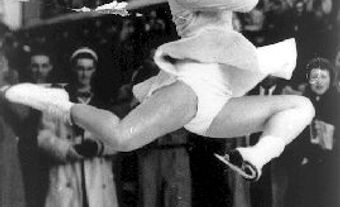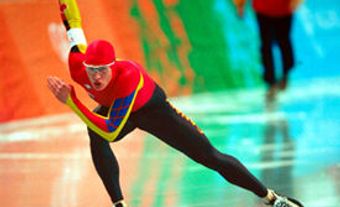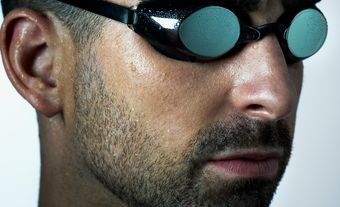This article was originally published in Maclean’s magazine on March 11, 2002. Partner content is not updated.
Canadian Men's Hockey Team Wins Olympic Gold
Mike Richter got just a piece of Jarome Iginla's one-time snap shot with four minutes left in the OLYMPIC gold-medal men's hockey game. It was a desperate effort by the American goalie, who was sliding across the crease to his right and had to reach back with his left hand to intercept the Canadian winger's blast. As if in slow motion, the puck tumbled end-over-end off Richter's glove, headed toward the bottom right-hand corner of the gaping net.
Around the packed E Center, there was a collective gasp as fans watched the puck's progress. Its fate was critical: Canada held a slim 3-2 lead, and with so little time on the clock, the Americans had to keep the score close if they were to have any chance. On the benches, players from both teams stood up to get a better look. In the second deck, the most anxious observers of all - Team Canada managers Wayne GRETZKY, Kevin Lowe and Steve Tambellini - leaned out over the balcony in anticipation. And on the ice, Joe Sakic, Iginla's centreman and the person closest to the play, tried to redirect the fluttering puck in mid-air with his stick to make sure it went in. He missed.
Anyone who has followed men's international hockey competition lately knows Canada's ambitions have frequently been thwarted by near-misses and really hot goaltenders. In fact, it was the very same Richter who stoned the Canadians at the 1996 World Cup of Hockey, handing the otherwise out-gunned Americans a major upset. Two years later in Nagano, Dominik Hasek, the Gumby-like goalie for the Czech Republic, was unbeatable in the semifinal shootout and led the Czechs to the gold medal.
But Canada got the bounce this time. The puck dropped inside the post, just before defenceman Tom Poti could get to it and sweep it out of harm's way. On the ice, Iginla, Sakic and Steve Yzerman practically crushed one another in celebration. Canadian fans in the stands, who made up about 30 per cent of the crowd of 10,000, went berserk, waving flags and shouting CA-NA-DA! Gretzky and Co., meanwhile, leaped from their seats, propelled as much by stress relief as joy. The pressure that built over 18 months as the 2002 Olympic team was put together, the frustrations of past but never-forgotten losses, and the sleepless nights that preceded Sunday's final were swept away in the exultation of the moment. "Our country desperately needed to win this tournament," an exhausted Gretzky said afterwards.
It was all over but the anthem. And not the tinny rendition that was played over the public-address system during the medal ceremony. With 30 seconds left, red-clad fans rose from their seats all around the arena and belted out their own heartfelt O Canada. By then, Sakic - named the tournament MVP - had made it 5-2, beating Richter on a breakaway. It was spontaneous and sweet and moving, not just for those in the crowd but also for the players. Hearing fans singing the anthem "was just unbelievable," forward Simon Gagné said. "It became tough to focus on the game because it was such a great feeling. It made me so proud to be part of the team that brought the gold medal back after 50 years."
For that alone, the final competition on the 2002 Winter Games schedule deserves to be considered among the defining moments in Canada's collective experience, right there with pivotal elections and Expo 67. The hockey precedent has been set: Game 8 in the 1972 Summit Series against the Soviet Union in Moscow is already there. So too the Montreal Canadiens vs. Red Army confrontation on New Year's Eve in 1975. Ditto Gretzky-to-Lemieux at the 1987 Canada Cup. And a strong case can be made for the women's team's thrilling 3-2 triumph over the United States that gave Canada its first hockey gold here.
It's not that a game is so important, or even hockey. It's that so many watched this game and cared about it that it became a cultural event transcending sport. According to overnight ratings, the men's final drew an average of 10.25 million viewers on Sunday afternoon, which makes it the most-watched TV program in Canadian history. Viewership peaked at nearly 12.6 million during the closing minutes and post-game celebrations. For fans in the arena, it was once-in-a-lifetime stuff. "What an amazing game - unbelievable," a deliriously happy Seth Boro, 26, of Ottawa, said after the medals had been handed out. "I think this is our generation's '72, without a doubt."
It wasn't just a scoreboard success. The final game was a thing of beauty. It didn't have the last-minute heroics of 1972 and 1987, but it sustained a breathtaking pace from the opening faceoff to the final whistle. Most strikingly to Canadian fans, there was the unshakeable conviction of their team, which had started slowly in the Olympic tournament but had rounded into form at precisely the right time. The big defencemen - Chris Pronger, Rob Blake and Adam Foote especially - had figured out the trick of keeping incoming forwards to the outside on the large ice surface, and limiting opposition attacks. And Sakic, Iginla and Gagné had become the most dangerous forward unit at the Games.
On Sunday, even in the pre-game warm-up, the players were deliberate and focussed, and once the puck was dropped, their opponents noticed. "You could tell they needed it," said U.S. stalwart Jeremy Roenick. "You could tell in the way they played. Fifty years of emotion was pent up in the way they played. I would have loved to win, but I respect the people who won tremendously. It was an honour to play in today's game."
What a way to conclude an Olympics. Over the final seven days here, Veronica Brenner and Deidra Dionne finished silver-bronze in freestyle aerials. In short-track speed skating, the women's 3,000-m relay team took bronze, while the women's hockey team grabbed their gold. The women's curling rink won bronze and the men followed with silver. Speed skater Clara Hughes produced a gutsy bronze-medal performance in the 5,000 m - a finish that made the former cyclist the first Canadian ever to win medals in both Summer and Winter Games (she earned two bronze medals in 1996). And then, on the eve of the last men's hockey game, three-time Olympian Marc Gagnon and teammate Jonathan Guilmette finished one-two in the 500-m short-track final and then led the men's 5,000-m relay team to yet another gold later that night. Talk about stoked - after a tough start to the Olympics, that great sporting intangible, momentum, had shifted Canada's way.
The women's hockey victory was the most energizing because of it's underdog appeal. The two North American teams were the class of the tournament, and the game was played at a ferocious clip. But Canada's women were decided long shots since they had lost eight straight pre-Olympic games to the Americans. And although they cruised easily through earlier games, the Canadians struggled against the Finns in the semifinal before finally getting untracked in the third period for a come-from-behind, 7-3 win.
But who can predict an Olympic result? There was plenty of motivation on the Canadian side: they lost the gold medal in 1998 to the Americans, and that memory was still agonizingly fresh for the veterans on the team. So in the championship game here, they set the pace from the start, forechecking the U.S. to a standstill for long stretches. And they achieved that despite an incomprehensibly one-sided effort by the American referee, Stacey Livingston, who at one stage called eight straight penalties against Canada and seemed intent on making sure the home team won. Led by Hayley Wickenheiser and Vicky Sunohara, the Canadian penalty killers did wonders. And even then, the 3-2 final score doesn't quite do justice to the Canadian team's edge in play. There was no doubt that the better team won. "We didn't care about those eight games we lost," captain Cassie Campbell said after the joyous final. "This was the only game that counted."
The men weren't sure bets either, especially in the minds of hockey-obsessed second-guessers who for months debated every single player selection and management appointment. Their criticism turned particularly nasty when the team started so slowly, losing its first game 5-2 to Sweden and only just edging the Germans, 3-2. The players were alarmed, too, especially after the spanking they took in the opener. "After the Sweden game," Sakic said, "there were a lot of doubters. But that game forced us to come together as a team."
As the nail-biter against Germany illustrated, that coming together didn't happen immediately. Gretzky, who isn't used to such widespread criticism, was also feeling the burden of responsibility - his hand-picked group of players appeared to be going in the wrong direction. He admits it was getting to him, and that he leaned on old pal Lowe, the Edmonton Oilers general manager, for stability. Yet he summoned a trick learned from his former Oiler coach, Glen Sather, by steering the negative attention away from the players. After Game 3 against the Czechs, a 3-3 tie that was the team's first promising performance, and on the eve of the more important stage of the tournament, Gretzky lashed out uncharacteristically, suggesting, among other odd things, that the whole world wanted Canadian hockey to fail.
It was a thinly veiled "Us vs. the World" call to arms - some U.S. newspapers likened it to Knute Rockne's "Win one for the Gipper." Instantly, Gretzky became the focus of fans' anxiety, and while there's no way of knowing if it helped the players, the gold medal suggests it didn't hurt. "Our team, behind the scenes and everywhere, had taken so much criticism," a tired-looking Gretzky explained after the final. "I felt we weren't comfortable and relaxed. I felt, 'Okay, take some heat off the guys,' and I did. But I didn't sleep for five days."
There was no Paul Henderson here. An unlikely star, Henderson scored three straight game-winning goals in 1972, including the famous last one off a scramble in front of Vladislav Tretiak. But the team owed much to its experienced hands. Playing hurt, Mario Lemieux wasn't the imposing figure many had hoped he'd be, but his leading-by-example style, along with that of Yzerman and Sakic, was crucial. After being released by their National Hockey League teams, the players had only one practise day before the games started here. And there were those initial growing pains. "The first couple of games, there wasn't a lot of talk in the dressing room, not a lot of emotion," said centre Joe Nieuwendyk. "Guys were trying to figure out their roles, so it took awhile to come together."
It showed, of course, but the veterans stayed calm, Gretzky was unflaggingly confident, at least in public, and eventually 23 players from 15 NHL teams became a unified force. Strong on defence, tough along the boards, dangerous in the offensive zone and, above all, fast. "I wish we could take this team and barnstorm with it. Become the Globetrotters," enthused coach Pat Quinn after it was all over.
The NHL, the players' association and the International Ice Hockey Federation have yet to negotiate an agreement with organizers of the 2006 Olympics in Turin, Italy, to send the top pros to those Games. Some NHL team owners resent having to interrupt their regular season during Olympic years. Nor do they like it when the guys they pay to play get injured at the Games, when they're only playing for national pride. The Detroit Red Wings, for instance, lost their leading scorer, Brendan Shanahan, and captain, Yzerman, for a couple of games. Yzerman never fully recovered from January knee surgery, while Shanahan broke his right thumb midway through the tournament. Both played at the Olympics when they probably shouldn't have. "You can go a long way on adrenaline," Shanahan said, smiling. "Adrenaline and painkillers."
If the NHL does balk in 2006, it would be a terrible loss for fans. Just as in 1998, the Olympic tournament was an exhibition of the best hockey seasoned observers had ever seen. On the wider international ice surface, it was an exciting, free-wheeling spectacle, the kind that cramped NHL rinks can't accommodate. And these were the greatest players on Earth: Canada, the U.S., Russia, Sweden, Czech Republic and Finland all had dream team-like rosters stocked with NHL stars. "I don't think you'll see any country dominate international hockey again, because everyone's so balanced," said Yzerman. "It's now down to who gets it together. Look at Sweden - they were awesome" - and even then they somehow lost to upstart Belarus. Since the Olympics are supposed to feature the world's best athletes, it makes sense that hockey should showcase its best players, too. "Hopefully, this sends a message to the NHL," said Tom Greenberg, a 26-year-old Torontonian who flew in for the final. "The game belongs here."
The players agree. The Olympics are the only true international contest for them. The world championships fall right in the middle of the NHL playoffs every year, so nobody cares. The Canada Cup is deceased and the World Cup is in mothballs, and neither of them interested the Europeans much. But a gold medal meant something to every player here, and that incentive makes for great hockey. "I just hope they keep using NHL players in the Olympics," Yzerman said.
As in 1998, the players mostly lived in the athletes village, and the camaraderie among competitors in different sports was something Gretzky cherished about his Nagano experience. "Even though we lost," he said, "being part of the team at the Olympics is still one of the greatest experiences of my life." The energy and success of other athletes was valuable in Salt Lake as well. "We took a lot of inspiration," Pronger said, "from how Canada's women's team played against the U.S."
As abruptly as they were thrown together, the players dispersed. There will be no men's hockey parade down Ste-Catherine or Yonge or Portage or Granville because the players' employers wanted them back and filling seats in NHL rinks right away. Fair enough - the NHL clubs are the ones playing the big bucks. But for fans, it'll probably take some time to get excited about pro hockey after seeing what the game can be like when the world's best get some room to move. And for the millionaire members of Team Canada, well, it's doubtful they'll ever forget how much fun they had playing for nothing more than national pride.
See also CANADIAN OLYMPIC HOCKEY TEAMS.
Maclean's March 11, 2002

 Share on Facebook
Share on Facebook Share on X
Share on X Share by Email
Share by Email Share on Google Classroom
Share on Google Classroom


